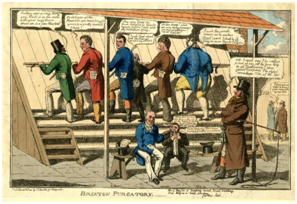
Dr Williams showed to the Sawston Village History Society, using London’s few surviving ‘bastardy books’, how the parishes of Lambeth, Southwark and Chelsea pursued the fathers of illegitimate babies. But London’s parishes were inefficient at extracting payment from the fathers of bastard children compared to other areas of the United Kingdom. Only 20 % of unmarried fathers paid for their illegitimate children in London, compared with 80 % in the West Riding of Yorkshire.
However, even where fathers did not pay, metropolitan parishes continued to support illegitimate children until they were 12 years old, at the charge of ratepayers. There was deep gender inequality in the severity of punishments handed out to unmarried parents, with women sentenced, on average, to a year’s hard labour for having children out of wedlock, compared to only three months’ for men.
What the archives show is that there was a very early version of the Child Support Agency in place in all towns and villages. Bastardy books must have existed in many parishes, but very few now survive. Of all first births, half were to pregnant brides and a quarter were illegitimate.
The Poor Law of 1576 formed the basis of English bastardy laws. Its purpose was to punish a bastard child's parents, and to relieve the parish from the cost of supporting the child. The poor sometimes ended up in prison for having children out of wedlock, with babies ending up in houses of correction with their mothers to avoid the parish having to pay for a wet or dry nurse. Children born outside of marriage were around twice as likely to die as those born to married parents – a trend that continued until at least the early 20th century.
The records show that although parish constables were actually quite skilled at finding fathers in the first place, they were really pretty bad at getting the money out of them. Men could disappear easily, even in one case where one man fathered five illegitimate children, then left them and disappeared off to America. Lots of men defaulted on payments and ran away, but for those who remained, arrest warrants were issued and many were sent to prison to see if they could be squeezed. Many were literally put on the treadmill, most infamously at Brixton’s House of Correction.

Attitudes towards the inherent shame of bearing illegitimate children waxed and waned over time, with post-Restoration attitudes softening as Britain underwent something of a sexual revolution in the late 1600s and early 1700s (the Foundling Hospital opening its doors in 1739).
However, societal response to illegitimacy began to harden once more in the early 19th century. The pursuit of errant fathers as a means of deflating local taxes was in place for centuries and until 1834, a father of illegitimate children was still responsible for paying for upkeep even if the mother married another man.
Jim Butchart